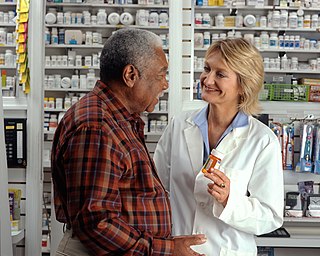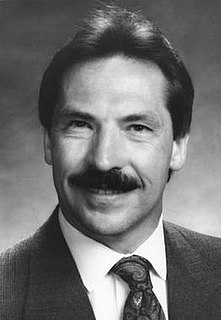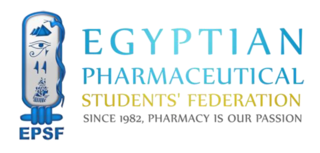
Pharmacists, also known as chemists or druggists, are health professionals who focus on the safe and effective use of medications, as they have expertise in the composition, effects, metabolism, mechanism of action and proper usage of drugs. Using knowledge of the mechanism of action of drugs, the pharmacist understands how they should be used to achieve maximum benefit, minimal side effects and to avoid drug interactions. Pharmacists undergo university or graduate-level education to understand the biochemical mechanisms and actions of drugs, drug uses, therapeutic roles, side effects, potential drug interactions, and monitoring parameters. This is mated to anatomy, physiology, and pathophysiology. Pharmacists interpret and communicate this specialized knowledge to patients, physicians, and other health care providers.

Pharmacy is the clinical health science that links medical science with chemistry and it is charged with the discovery, production, disposal, safe and effective use, and control of medications and drugs. The practice of pharmacy requires excellent knowledge of drugs, their mechanism of action, side effects, interactions, mobility and toxicity. At the same time, it requires knowledge of treatment and understanding of the pathological process. Some specialties of pharmacists, such as that of clinical pharmacists, require other skills, e.g. knowledge about the acquisition and evaluation of physical and laboratory data.
A Doctor of Pharmacy is a professional doctorate in pharmacy. In some countries, it is a first professional degree and a prerequisite for licensing to practice the profession of pharmacy or to become a clinical pharmacist. In many countries they are allowed to practice independently and can prescribe drugs directly to patients. A PharmD program has significant experiential or clinical education components in introductory and advanced levels for the safe and effective use of drugs. Experiential education prepares graduates to be practice-ready, as they already have spent a significant amount of time training in areas of direct patient care and research. A PharmD graduate is entitled to prefix their name with "Dr."
The International Pharmaceutical Federation or Fédération Internationale Pharmaceutique, abbreviated as FIP, is an international federation of national organisations that represent pharmacists and pharmaceutical scientists. It was founded in 1912 and is based in The Hague in the Netherlands.
Pharmacy and Therapeutics (P&T) is a committee at a hospital or a health insurance plan that decides which drugs will appear on that entity's drug formulary. The committee usually consists of healthcare providers involved in prescribing, dispensing, and administering medications, as well as administrators who evaluate medication use. They must weigh the costs and benefits of each drug and decide which ones a person and the most efficacy per dollar. This is one aspect of pharmaceutical policy. P&T committees utilize an evidence-based approach to drive change within health systems/plans by changing existing policies and bringing up-to-date research to support medical decision-making.
Pharmacotherapy is therapy using pharmaceutical drugs, as distinguished from therapy using surgery, radiation, movement, or other modes. Among physicians, sometimes the term medical therapy refers specifically to pharmacotherapy as opposed to surgical or other therapy; for example, in oncology, medical oncology is thus distinguished from surgical oncology. Pharmacists are experts in pharmacotherapy and are responsible for ensuring the safe, appropriate, and economical use of pharmaceutical drugs. The skills required to function as a pharmacist require knowledge, training and experience in biomedical, pharmaceutical and clinical sciences. Pharmacology is the science that aims to continually improve pharmacotherapy. The pharmaceutical industry and academia use basic science, applied science, and translational science to create new pharmaceutical drugs.
Founded by Dr. Naim Anwar Muzzafar, the Pakistan Pharmacists Association (PPA) is the national professional body of pharmacists and pharmacy students in Pakistan. It has a mission to promote and expand the profession of pharmacy and the role of pharmacists. The association is dedicated to improving public health and patient care by enhancing professional development of the pharmacists along with Pharmacy Council of Pakistan.

R. Tim Webster, SCD was a founder and long-time executive director of the American Society of Consultant Pharmacists (ASCP). He was born October 9, 1946, in Martins Ferry, Ohio and lived in St. Clairsville, Ohio until he graduated from high school. He received his degree in pharmacy from Ohio State University (OSU) in 1969 and then dedicated his entire career to promoting quality pharmaceutical care to the elderly. Prior to his 27-year tenure as executive director of the ASCP, he was involved in regulatory affairs relating to long-term care in both the public and private sector. He died of cancer on July 6, 2003.

Clinical pharmacy is the branch of pharmacy in which clinical pharmacists provide direct patient care that optimizes the use of medication and promotes health, wellness, and disease prevention. Clinical pharmacists care for patients in all health care settings but the clinical pharmacy movement initially began inside hospitals and clinics. Clinical pharmacists often work in collaboration with physicians, physician assistants, nurse practitioners, and other healthcare professionals. Clinical pharmacists can enter into a formal collaborative practice agreement with another healthcare provider, generally one or more physicians, that allows pharmacists to prescribe medications and order laboratory tests.
Unaffordable medications are a hole in the Chinese safety net. This forces workers to save as much as possible in order to weather family medical emergencies, which acts to depress domestic consumption, leaving no alternative to the traditional unsustainable export and investment driven economic model.
The basic requirement for pharmacists to be considered for registration is an undergraduate or postgraduate pharmacy degree from a recognized university. In many countries, this involves a four- or five-year course to attain a master of pharmacy degree (MPharm). In the United States of America, students graduating after January 1, 2003, must complete a doctor of pharmacy degree to become a licensed pharmacist. This same requirement has been coming into place in other countries such as Canada and France.

A pharmacy is a retail shop which provides pharmaceutical drugs, among other products. At the pharmacy, a pharmacist oversees the fulfillment of medical prescriptions and is available to counsel patients about prescription and over-the-counter drugs or about general health issues. A typical pharmacy would be in the commercial area of a community.
Chinese Public Administration Society (CPAS) is a nationwide academic institution, whose vocation is specialized in the research of administrative theories and practices, development of administrative sciences and promoting public services.

The International Pharmaceutical Students' Federation (IPSF) is a non-governmental, non-political and non-religious organisation that represents pharmaceutical students, pharmacy students and recent graduates from all over the world. It was founded in 1949 and it is the oldest faculty-based student organisation. IPSF represents over 500,000 individuals in more than 100 countries with 127 different representative pharmacy student member organisations.

UIC College of Pharmacy at the University of Illinois Chicago is one of the oldest pharmacy schools in the country, and oldest unit of the University of Illinois system. Established in 1859, the College is consistently ranked in the national top 10 for both pharmacy education and in pharmaceutical research, and is renowned for its seamless integration of educational, pharmacy services, and research programs. With outstanding research and clinical faculty, which are one of the largest in the country, UIC has some of the longest-standing and most sought-after pharmacy residency, fellowship, and graduate programs in the world. With a network of over 10,000 alumni, graduates of the UIC College of Pharmacy are leaders in pharmacy practice, pharmaceutical industry, and academia across the US and abroad.

The Egyptian Pharmaceutical Students' Federation (EPSF) is an independent student organization representing about 85,000 pharmacy students in 34 pharmacy schools all over Egypt. It works under the supervision of the Egyptian Pharmacist Syndicate, the national FIP member. Since 1982 EPSF has also been a Full Member organization representing Egypt in the International Pharmaceutical Students' Federation.
The Pharmaceutical Association of Mauritius (PAM) is a professional society serving pharmacists in Mauritius. It was founded by a group of pharmacists in 1979.

The USC School of Pharmacy is the pharmacy school of the University of Southern California, originally established in 1905 as USC College of Pharmacy. In 1918, it created the four-year bachelor of science in pharmacy degree program. In 1950, it established the nation's first Doctor of Pharmacy (PharmD) program. The School offers numerous dual- and joint-degree programs in such fields as law, business, public health, regulatory science, healthcare decision analysis, and gerontology. The School launched the nation's first PharmD/MBA dual degree in 1990, the first PhD in pharmaceutical economics and policy in 1994, the first professional doctorate in regulatory science in 2008, and a translational science graduate program that merges science with clinical expertise. The School is led by Dean Vassilios Papadopoulos.

Nadia Bukhari is a British pharmacist of Pakistani origin living in London, United Kingdom. In 2018, she was awarded the status of Fellow of the Royal Pharmaceutical Society (RPS) making her the youngest female fellow under the Royal Pharmaceutical Society of Great Britain; an honor bestowed to those who have achieved excellence and distinction in their pharmacy career. In addition, she is the first Muslim female and British Pakistani to be a board member of the National Association of Boards of Pharmacy for England, UK. Since 2003, she has been serving in academia at University College London (UCL). She wrote and published many articles on the pharmacy and leadership field at Pharmaceutical Press and BMC Series. In Pakistan, she received the honor to launch the National Alliance for Women in Pharmacy (NAWP) under the Pakistan Pharmacists Association (PPA). She is the global lead at the International Pharmaceutical Federation (FIP) to promote gender equity in the pharmaceutical industry. Also, she has been serving as a trustee and an ambassador for the Pakistan Alliance for Girls Education (PAGE); a charity program supported by the Government of Pakistan. She is also an executive committee member at Indus Health Network UK. She is the chief pharmacist at doctHERs; a telemedicine company in Pakistan enabling home-based healthcare females to work in the pharmaceutical industry and connect with low-income patients across Pakistan.

The Pharmaceutical Society of Ghana was founded on December 19, 1935 out of the former Gold Coast Pharmacists and Druggists Union and the Chemists Defense Association which had existed before 1929. The Society was founded by a group of pharmacists led by William Ayiah Hansen, Hansdrug College of Pharmacy, Hansdrug Hall, Accra. He did so with the support of Dr. D. Duff, then the Director of Medical Services. William Ayiah Hansen was then the Organizing Secretary and Registrar of the Society. Before 1935, the predominant Pharmacists groups in Ghana were two associations. Pharmacists affiliated themselves to these groups according to their bonding or non-bonding to government service. The private pharmacists groups were led by William Ayiah Hansen.










